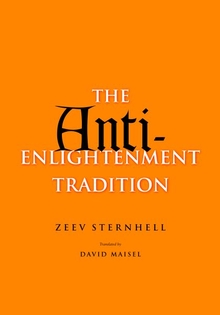The Anti-Enlightenment Tradition
WARNING
You are viewing an older version of the Yalebooks website. Please visit out new website with more updated information and a better user experience: https://www.yalebooks.com
Zeev Sternhell; Translated by David Maisel
In this masterful work of historical scholarship, Zeev Sternhell, an internationally renowned Israeli political scientist and historian, presents a controversial new view of the fall of democracy and the rise of radical nationalism in the twentieth century. Sternhell locates their origins in the eighteenth century with the advent of the Anti-Enlightenment, far earlier than most historians.
The thinkers belonging to the Anti-Enlightenment (a movement originally identified by Friederich Nietzsche) represent a perspective that is antirational and that rejects the principles of natural law and the rights of man. Sternhell asserts that the Anti-Enlightenment was a development separate from the Enlightenment and sees the two traditions as evolving parallel to one another over time. He contends that J. G. Herder and Edmund Burke are among the real founders of the Anti-Enlightenment and shows how that school undermined the very foundations of modern liberalism, finally contributing to the development of fascism that culminated in the European catastrophes of the twentieth century.
Zeev Sternhell, who won the 2008 Israel Prize in political science, is Leon Blum Professor of Political Science, Hebrew University.
"Few scholars comprehend the nexus between Counter-Enlightenment discourse and fascist ideology as well as Zeev Sternhell. In Anti-Enlightenment Tradition, Sternhell provides a series of provocative and disturbing arguments to demonstrate convincingly just how fraught and intimate those linkages were. Anti-Enlightenment Tradition represents a landmark and transformative contribution to the political history of ideas."—Richard Wolin, author of The Seduction of Unreason: The Intellectual Romance with Fascism from Nietzsche to Postmodernism
"In his The Anti-Enlightenment Tradition, Professor Sternhell has provided us another work of impeccable scholarship and intellectual stimulation. It is recommended to all who are interested in the fate of our civilization."—A. James Gregor, University of California, Berkeley
"Everything Zeev Sternhell writes is powerful and challenging, and this book is no exception. At a time when Enlightenment values are again under attack, this history of anti-Enlightenment thought is important and timely."—Robert Tombs, University of Cambridge
"Everybody who looks for an explanation of the puzzling fact that Naziism—a primitive ideology without intellectual weight—did find a sympathetic response among German intellectual elites of the time should consult this brilliant book. Zeev Sternhell defends the normative core of the enlightenment by passionately dismantling a celebrated and sophisticated tradition of counter-enlightenment thinkers."—Jürgen Habermas
Publication Date: December 22, 2009








